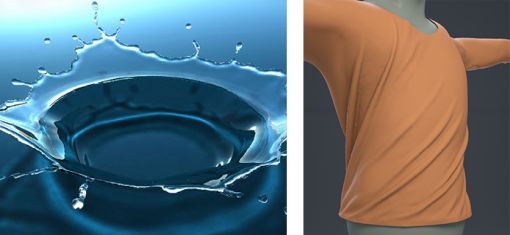Physically-based Simulation in Computer Graphics
VORL; 4 SWS; ECTS: 5; Prof. Dr.-Ing. Tobias Günther
Reiter

Description
Over the past decades, computer graphics became a vital component of the entertainment industry. Whether in regards to video games, animation movies, or visual effects in live action productions, computer animation brings virtual worlds to life. Thereby, physically-based simulations are required to reach the necessary degree of realism. Based on differential equations and numerical methods to solve them, this lecture will cover a series of algorithms used to implement physically-based simulations.
Content
The lecture covers the following topics:
- kinematics and dynamics of motion (generalized coordinates),
- numerical time integration techniques (explicit and implicit time integration),
- rigid bodies (simulation, collision detection and response),
- deformable objects (mass-spring-systems, finite-elements and thin shells),
- grid-based fluid simulation (fractional step method),
- particle-based fluid simulation (smoothed particle hydrodynamics and viscosity),
- hybrid fluid simulation (fluid implicit particle FLIP, liquid-air interfaces),
- adding detail to smoke, fire (vorticity confinement, wavelet turbulence),
- shallow water waves and oceans
The practical course consists of lectures and programming exercises. This course is taught in English.
Grading
The course is concluded with an oral exam in presence (30 minutes) at the end of the semester, which fully determines the course grade. The programming exercises are mandatory and a passing score of 80% is required to complete the ungraded certificate.
Goals and Competences
Students are able to:
- apply numerical time integration methods at practical examples
- derive and analyze the properties of equations of motion
- set appropriate boundary conditions
- compare numerical solvers regarding stability, accuracy and performance
- describe different techniques for rigid body, deformable, and fluid simulations
- implement the algorithms in C++
Lecture Recordings
Pre-recordings of the lectures are made available on FAU.tv.
Registration
The course is open for registration in the weeks prior to the start of the summer semester. At any other time, you can send your IdM to ✉ tobias.guenther@fau.de and ask for admittance into the StudOn course.
Kategorien
Kurse
Physically-based Simulation in Computer Graphics - SoSe 25
Vorlesung, PhysSim, Englisch
Do 14:15 - 15:45
Tobias Günther
Sommer 2025: | | » campo
Um dieses Objekt zu nutzen, müssen Sie angemeldet sein und entsprechende Zugriffsrechte besitzen.
Tobias Günther
Sommer 2025: | | » campo
Um dieses Objekt zu nutzen, müssen Sie angemeldet sein und entsprechende Zugriffsrechte besitzen.
